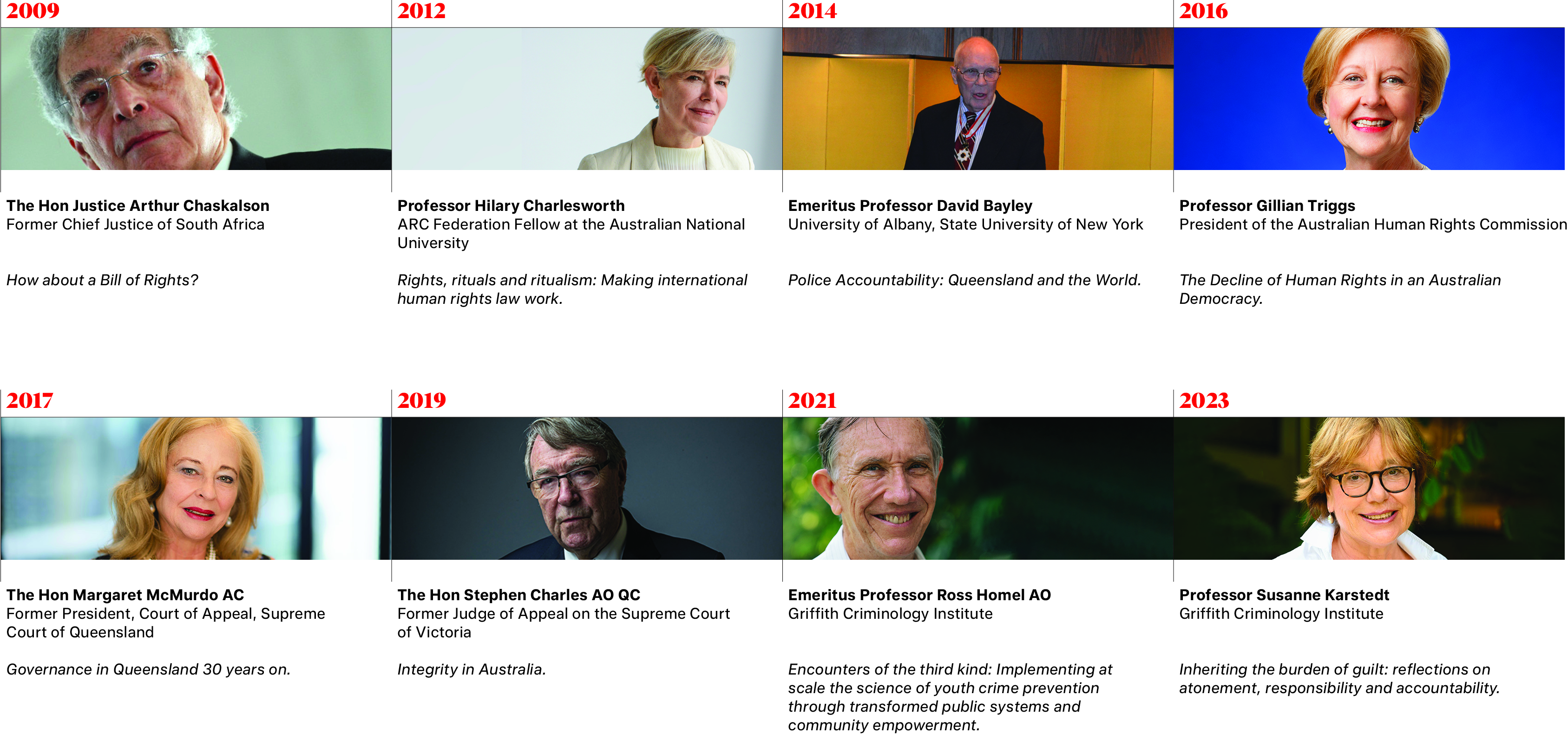Examining longstanding police misconduct
The Fitzgerald Inquiry was established in 1987 to examine longstanding police misconduct. In its two years it exposed systematic, entrenched corruption and maladministration throughout Queensland’s public sector and among Cabinet Ministers.
The 1989 Fitzgerald Report was a landmark. It threw a spotlight on corrupt individuals and systems, but it also established a blueprint for lasting reform. It recommended new bodies to oversee those reforms in criminal justice and governance; many of which have not only endured but provided models for other jurisdictions.
The decades since the Report demonstrate that enduring reform requires vigilance, and ongoing oversight of public governance and accountability.
In recognition of this, in 2009, to mark the Report’s 20th anniversary, Griffith University launched the Tony Fitzgerald Biennial Lecture Series. The lectures from esteemed Australian and international speakers continue to put the spotlight on Tony Fitzgerald’s themes of democracy, human rights, accountability and corruption.
Sustainable Development Goals
Griffith University is aligned with the United Nation’s Sustainable Development Goals (SDGs) and is committed to promoting the values of peace, justice and accountability, to contribute to a more just and equitable world where everyone can enjoy their fundamental rights and live in harmony.
2023 Tony Fitzgerald Lecture
Inheriting the burden of guilt: Reflections on atonement, responsibility and accountability
Professor Susanne Karstedt
Professor Susanne Karstedt joined the Griffith Criminology Institute and the School of Criminology and Criminal Justice in 2015. Before coming to Griffith University she taught and researched at universities in her native Germany and the United Kingdom. Susanne Karstedt is an internationally renowned criminologist and socio-legal scholar.
As a migratory criminologist she works with a focus on comparative perspectives. She has pioneered work on atrocity crimes and transitional justice, on emotions, crime and justice, and on the impact of democracy and values on violence across three decades. She has developed indices of prison conditions and the level of violence in countries across the globe and has explored the policy-relevance of comparative criminology. She has published more than 250 books, edited volumes, peer-reviewed papers and book chapters, and has worked in editorial roles for leading journals and book series.
Professor Karstedt has won many awards for her work from both disciplines and different countries. These include the Sellin-Glueck Award of the American Society of Criminology for ‘international contributions to criminology’, the European Criminology Award of the European Society of Criminology for ‘a lifetime contribution as a European criminologist’, and the Beccaria Gold Medal for ‘outstanding achievements in criminology’ from the German Criminological Society. She received the International Award of the Law and Society Association, and the Freda Adler Distinguished Scholar Award from the International Division of the American Society of Criminology. Her book on middle-class crime, co-authored with Stephen Farrall won the Outstanding Book Award from the Division of White-Collar and Corporate Crime of the American Society of Criminology. In 2020, she was elected a Fellow of the Academy of the Social Sciences in Australia.
ABSTRACT / Inheriting the burden of guilt: Reflections on atonement, responsibility and accountability
The Fitzgerald Commission of Inquiry was a courageous endeavour and outstanding achievement to address past wrongs and injustice in order to prevent their recurrence and secure a more just future for all. It is in this vein and spirit that I reflect on the burden of guilt for massive wrongs and injustice that later born generations inherit, and the responsibility that comes with it. The past is not a foreign country. It was the present not so long ago and we are part of the history of our peoples through many connections.
Countries across the globe are beginning to address both the most distant and most recent wrongs and atrocities committed in the name of the people and by institutions of the state. Criminal justice institutions often and foremost are implicated in crimes against humanity, and many respectable citizens have profited from mass atrocities. Like US philosopher Susan Neiman, I choose Germany for a reflection on guilt and responsibility. ‘Coming to terms with the past’ is a process with pitfalls and gaps, of silence and thoughtlessness (Hannah Arendt), of justice done and justice denied, and accompanied by twists and tensions. Uncovering a burning truth from denial, and accepting guilt and responsibility takes time and often more than one generation. In this lecture I explore what we can learn from each other about the painful process of confronting guilt and responsibility.
Fitzgerald Lecture Series 2009 to 2023

2023 Tony Fitzgerald Lecture Transcript
Inheriting the Burden of Guilt: Reflections on Atonement, Responsibility and Accountability.
Fitzgerald Lecture Series Live Recordings 2009 to 2023
2023 Tony Fitzgerald Lecture
Professor Susanne Karstedt, Griffith Criminology Institute, presents "Inheriting the burden of guilt: Reflections on atonement, responsibility and accountability" with Professor John Braithwaite, Australian National University, as discussant at the biennial 2023 Tony Fitzgerald Lecture on 6 June 2023.
